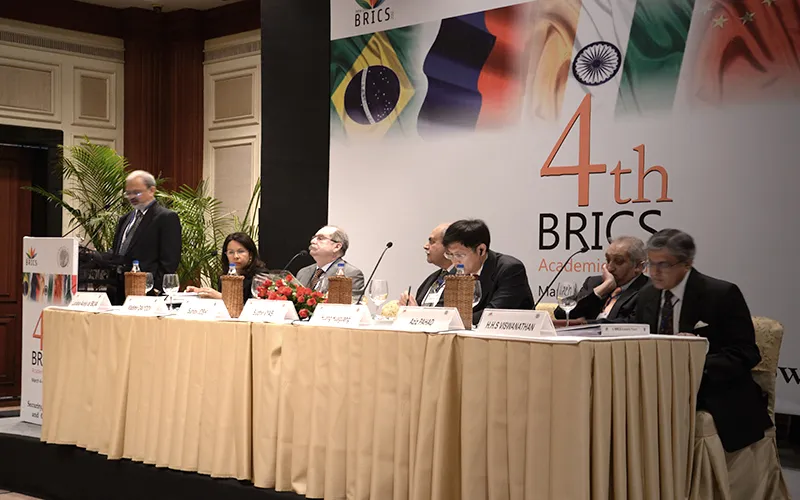India has asked scholars and experts from BRICS nations, attendng the Academic Forum meeting, to offer solutions and new ideas to meet global challenges.

India’s Sherpa to BRICS New Delhi Summit and Secretary, Economic Relations in the Ministry of External Affairs, Mr. Sudhir Vyas, on Monday (March 5) asked scholars and experts from BRICS nations to strive for building the world’s default "go to" institutions and agendas to meet global challenges.
Mr. Vyas was delivering the keynote address at the Fourth BRICS Academic Forum meeting which began in Delhi on Monday. The meeting is being hosted by Observer Research Foundation.
Mr. Vyas said "The way forward is not unhindered by challenges, but is simultaneously full of opportunities for enhancing our security, stability and growth."
He said though the BRICS nations have inherently different development and growth trajectories, they all stand at similar crossroads of policymaking. "The future has always been uncertain but it can be argued that the next decade of policymaking in the context of the individual nations of the BRICS consortium, will dictate whether they fulfil their development potential, and claim their stakes in the governance of global political and economic systems," he said. "The alternative is a reversion to the old world order, but it is not an option given that the BRICS represent nearly half the world’s population," he pointed out.
Mr. Vyas said that the BRICS "will do well to learn from our failures and also from the failures of the West - many contemporary examples of which are readily available for the research community to analyse and understand".
Welcoming over 60 delegates from think tanks and research institutions attending the three-day meeting, Mr. Sunjoy Joshi, Director, Observer Research Foundation, said that "had it not been for some of the BRICS economies, the decline in global GDP would have been far harder. Therefore it was no coincidence that the first forum took place in the backdrop of the global economic crisis".
Mr. Joshi pointed out that when the BRICS was coined in 2001, it was neither a forum nor a community. "2008 changed not just Golfman Sachs, but also the world. It also changed the way in which BRICS viewed itself. And as we meet in New Delhi now, the idea of BRICS with South Africa joining in Sanya has not only gained traction. It has found a momentum that was hitherto un-suspected. It has come to signify the shift in global Power".
Mr Joshi said "the trauma of 2008 gave birth to a strong undercurrent, the search for a new narrative that could replace the Bretton Woods diktats of yesterday. No wonder the repeated stress upon the need for a new global financial architecture that would make the global economy less prone and more resilient to future crises a greater need for a more stable, predictable and diversified international monetary system".
"The intervening years actually beguiled and misled many world over by showing signs of an early recovery. But again the crisis in the Eurozone under the shadow of which this summit takes place, has changed all that. This forum therefore is gathered around the three themes of Stability Security and Growth. And without stability and security there could be no growth".
Mr. Joshi said BRICS "represents the hopes and aspirations of almost a half of the worlds population. A billion there who have yet to attain any decent modicum of being. Therefore the importance the theme of Stability, Security and Growth".
He said that the programme over the next few days also incorporates elements of networking in order to go beyond the traditional mandate of being a purely instructional or debating platform.
The delegation leaders - Ms. Luciana Acioly Da Silva of Brazil, Mr. Vladimir Davydov of Russia, Mr. H.H.S Viswanathan of India, Mr. Huang Huaguang of China and Mr. Aziz Pahad of South Africa all agreed that the BRICS are now ready to assume a more important role in global governance.
The South African delegation leader acknowledged that the BRICS must focus on opportunities for contextual policymaking rather than following the West. The Chinese delegation leader said that the BRICS must assume leadership role in financial governance and responding to crises such as the recent global financial crisis in a coordinated manner. The Russian delegate leader said that the BRICS must strive to become more active in responding to political crises. The Brazilian delegation leader emphasised on the need to coordinate BRICS positions on the upcoming Rio+20 Summit on Sustainable Development.
The tag line for this year’s meetings between the political and academic representatives of the BRICS is "Stability, Security and Growth". While the emphasis is on the macro narratives of stability, security and growth, the BRICS seek to explore and collaborate on specific micro debates that are underlying.
The BRICS Academic Forum will release their recommendations for the BRICS Summit Leaders on Tuesday evening, after two days of discussions and debates, suggesting ways to meet the global challenges.
The views expressed above belong to the author(s). ORF research and analyses now available on Telegram! Click here to access our curated content — blogs, longforms and interviews.




 PREV
PREV

